英语动词时态讲解课件PPT课件
合集下载
动词时态PPT课件
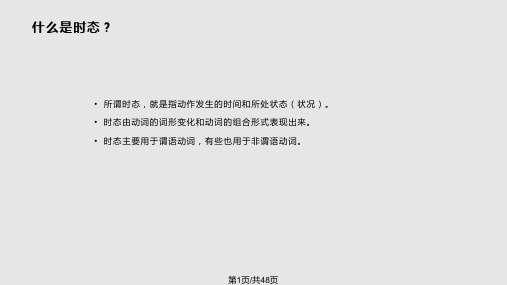
It can’t be Jim. he has gone to town . John knows the way well. He has been to the city before .
第25页/共48页
D. 瞬间动词和持续性动词 1. 他来北京五天了。
√ He has been in Beijing for 5
过去将来完成时 现在完成进行时
过去完成进行时 将来完成进行时
过去将来完成进行时
第14页/共48页
三、时态的用法
1、一般现在时:是表述现在或经 常性的动作,状态.
A. 表述现阶段或经常性的动作,状态。 他每天骑自行车上学。
He goes to school by bike every day. B. 表客观真理
days.
× He has come to Beijing for 5 days.
第26页/共48页
D. 瞬间动词和持续性动词
2. 小明入团三年了。
Xiao Ming has been in the League for 3 years.
√
√ Xiao Ming has been a League
member for 3 years
Xiao Ming has joined the League for three years.
×
第27页/共48页
D. 瞬间动词和持续性动词
3. 这本书他买了一年了。
He has had this book
√
for a year.
× He has bought this book
练习。
完 成
先结构,
后改1,
完成 和加1
进行
第25页/共48页
D. 瞬间动词和持续性动词 1. 他来北京五天了。
√ He has been in Beijing for 5
过去将来完成时 现在完成进行时
过去完成进行时 将来完成进行时
过去将来完成进行时
第14页/共48页
三、时态的用法
1、一般现在时:是表述现在或经 常性的动作,状态.
A. 表述现阶段或经常性的动作,状态。 他每天骑自行车上学。
He goes to school by bike every day. B. 表客观真理
days.
× He has come to Beijing for 5 days.
第26页/共48页
D. 瞬间动词和持续性动词
2. 小明入团三年了。
Xiao Ming has been in the League for 3 years.
√
√ Xiao Ming has been a League
member for 3 years
Xiao Ming has joined the League for three years.
×
第27页/共48页
D. 瞬间动词和持续性动词
3. 这本书他买了一年了。
He has had this book
√
for a year.
× He has bought this book
练习。
完 成
先结构,
后改1,
完成 和加1
进行
英语时态8种基本时态讲解.ppt课件

4)动词过去式变化规则。 a)一般情况下的词加-ed. work---worked call----called b)以不发音的字母e结尾的单词直接加-d . live----lived change----changed smoke----smoked die----died graduate----graduated drive----drove
8.过去完成时 表示动作发生在过去某一时间之前已经完成的动作或状态, 强调“过去的过去”, 常与 by the time, by the end of…,before , by 等引导时间的状语连用。
基本结构 主语+ had + 动词过去分词 + 其他成分 When I got to the cinema yesterday the film had begun already. He had learned English before he came here.
现在完成时与一般过去时的区别: 1)现在完成时侧重于对现在的影响;而一般过去时侧重于某一动作发生在过去某个时间或某段时间。即现在完成时侧重于现在的结果,而一般过去时侧重于动作发生的时间。例如:
I have seen the film. 我看过这部电影。(现在我仍记得电影的内容) I saw the film three days ago. 三天前我看了这部电影。(强调是三天前,而不是别的什么时候看的电影)
be going to含有“打算,准备”的意思,而will则没有这个意思, She is going to lend us her book. He will be here in half an hour.
be about to+V.原形(意为马上做某事,在时间上指最近的将来) I am about to leave school. 不能与表示时间的副词连用。 They are about to set out.(√) They are about to set,变y为i加-ed. study----studied carry----carried cry----cried try----tried d)以元音字母+y结尾的单词直接加-ed. play----played stay----stayed
8.过去完成时 表示动作发生在过去某一时间之前已经完成的动作或状态, 强调“过去的过去”, 常与 by the time, by the end of…,before , by 等引导时间的状语连用。
基本结构 主语+ had + 动词过去分词 + 其他成分 When I got to the cinema yesterday the film had begun already. He had learned English before he came here.
现在完成时与一般过去时的区别: 1)现在完成时侧重于对现在的影响;而一般过去时侧重于某一动作发生在过去某个时间或某段时间。即现在完成时侧重于现在的结果,而一般过去时侧重于动作发生的时间。例如:
I have seen the film. 我看过这部电影。(现在我仍记得电影的内容) I saw the film three days ago. 三天前我看了这部电影。(强调是三天前,而不是别的什么时候看的电影)
be going to含有“打算,准备”的意思,而will则没有这个意思, She is going to lend us her book. He will be here in half an hour.
be about to+V.原形(意为马上做某事,在时间上指最近的将来) I am about to leave school. 不能与表示时间的副词连用。 They are about to set out.(√) They are about to set,变y为i加-ed. study----studied carry----carried cry----cried try----tried d)以元音字母+y结尾的单词直接加-ed. play----played stay----stayed
初中英语语法动词及时态ppt课件
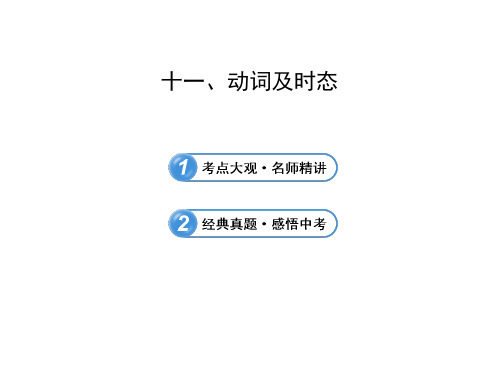
过去进行时 主语+was/were+v. -ing+其他
现在完成时 主语+have/has+过去分词+其他
中学阶段见到的其他时态 时态
构成
过去完成时 主语+had+过去分词+其他
过去将来时
现在完成 进行时
主语+would+动词原形+其他 主语+was/were going to+动词原形
主语+have/has+been+现在分词+其他
状语
【温馨提示】
(1)在含有时间状语从句的复合句中,延续时间较长的动作用过 去进行时,另一个短暂性动作用一般过去时。例如:
My pen dropped on the ground when I was walking in the park. 在公园散步的时候,我的钢笔掉到地上了。
(2)表示两个延续性动作在过去某一时刻同时进行,不考虑动作 的先后顺序,主句和从句的谓语动词都用过去进行时,连词常 用while。例如:
词
宾语,又分为及物动词和 不及物动词。
物动 run , walk , cry , 词 swim,fall,happen
连
系 连接主语和表示主语身份、be , seem , look , become ,
动
性质、状态的动词称为连 get , grow , feel , appear ,
系动词。
turn
day等频率副词或时间状语 month.
连用
我们每月都去看望刘叔叔。
用法
例句
表示客观事实或普遍真理 The sun rises in the east. 太阳在东方升起。
高中英语时态全版.ppt

Tom is seeing his friend off at the airport.
.精品课件.
16
过去进行时 表示过去某一时刻或某一段时间内正在进行 的动作。这一特定的过时间可用时间状语表 示
He was watching TV when I came in.
---What were you doing this time yesterday? ---I was writing a letter.
I will study hard to keep up with my classmates.
He won’t do it.
You shall have the book.
.精品课件.
8
2.be going to + 动词原形:含有打算、计划、 准备将做某事的意思,或表示很有可能要发 生的事。
3.若表示已安排或计划好的将来动作或存 在状态,可用一般现在时代替一般将来 时,其谓语动词常为be, come, go, arrive, leave, start等
Where shall we meet tomorrow?
.精品课件.
7
注:shall和will除了上述表示单纯的将来外, 还有其他用法。在第一人称后,will常表示 “决心”、“意愿”或“打算”,在否定
句中用于所有人称,有“不愿”的意思。 shall用于第二人称时,可表示说明者的将 来意愿或允诺。
the window.)
.精品课件.
4
7. 由here, there开头的句子,动词 用一般现在时表示正在发生的动 作。如:
There goes the bell.
Here comes the teacher.
英语十六种时态ppt课件

He went swimming yesterday. 昨天他去游泳了。 He was ill yesterday. 他昨天病了。
6
2.一般过去时的肯定、疑问、否定三种形式
肯定式
疑问式
否定式
I worked.
Did I work?
I did not work.
He (She, It)worked. Did he (she, it) work? He (She, It) did not work.
13
范围扩展
1. 用过去进行时表示现在主要是为了使语气委婉、客气。 I was wondering if you can give me a lift. 我不知你能否让我搭一下车。 (一般过去时也有类似用法,但比较而言,用过去进
行时显得更客气,更加不肯定。)
2.动词be的过去进行时也可表示过去一时的表现或暂时的 状态。
现在进行时表示说话时正在进行的动作或表示目前一段时 间内正在进行的活动,与现在进行时连用的时间状语有now, these days等。
—What is your mother doing now? 你的妈妈正在干什么? —She is cooking for us. 她正在为我们做饭。 2.现在进行时的具体用法
10
用法
例句
(1) 说话瞬间正在发生的动作,常见的时间 They are watching TV now.
状语有now,at the moment等。如果句首有 他们现在正在看电视。
警示性动词look,listen等,主句的动词也 Listen! The bird is singing in the tree.
(2) be (am, is, are) going to + 动词原形 2.一般将来时的用法
6
2.一般过去时的肯定、疑问、否定三种形式
肯定式
疑问式
否定式
I worked.
Did I work?
I did not work.
He (She, It)worked. Did he (she, it) work? He (She, It) did not work.
13
范围扩展
1. 用过去进行时表示现在主要是为了使语气委婉、客气。 I was wondering if you can give me a lift. 我不知你能否让我搭一下车。 (一般过去时也有类似用法,但比较而言,用过去进
行时显得更客气,更加不肯定。)
2.动词be的过去进行时也可表示过去一时的表现或暂时的 状态。
现在进行时表示说话时正在进行的动作或表示目前一段时 间内正在进行的活动,与现在进行时连用的时间状语有now, these days等。
—What is your mother doing now? 你的妈妈正在干什么? —She is cooking for us. 她正在为我们做饭。 2.现在进行时的具体用法
10
用法
例句
(1) 说话瞬间正在发生的动作,常见的时间 They are watching TV now.
状语有now,at the moment等。如果句首有 他们现在正在看电视。
警示性动词look,listen等,主句的动词也 Listen! The bird is singing in the tree.
(2) be (am, is, are) going to + 动词原形 2.一般将来时的用法
2024年中考英语复习第十章:动词的时态和语态课件

在看电视。 2. 过去进行时常与always等表示频率的副词连用,表示过去频繁发生的习惯性动作。此 时的过去进行时有一点的感情色彩。 • Alice was always changing her mind. 爱丽丝总是改变主意。 时间状语:this morning, the whole morning, all day ,yesterday, from nine to ten
5. 对现在进行时的特殊疑问句的回答,它不可以用Yes或No直接作答,要根据实际
情况回答。
• -Yes,he is.是的。
-No,he isn't.不是。
现在进行时
现在分词的变化 1. 动词的后面直接加-ing。 • work-working,study-studying, play-playing 2. 以不发音的字母e结尾的动词,先去掉字母e,再加-ing。 • live-living 3. 以重读闭音节结尾并且只有一个辅音字母的动词,先双写这个辅音字母,再加- ing。 • stop-stopping,swim-swimming,run-running, get-getting
现在进行时
现在进行时的句式变化:
1. 肯定句式:主语+be( am, is, are)+现在分词+其它.
• Li Hua is cleaning the classroom.李华在打扫教室
2. 否定句式:主语+be(am, is, are) +not +现在分词+其它.
• Li Hua isn't cleaning the classroom.李华不是在打扫教室,
04
过去进行时
过去进行时
用法
5. 对现在进行时的特殊疑问句的回答,它不可以用Yes或No直接作答,要根据实际
情况回答。
• -Yes,he is.是的。
-No,he isn't.不是。
现在进行时
现在分词的变化 1. 动词的后面直接加-ing。 • work-working,study-studying, play-playing 2. 以不发音的字母e结尾的动词,先去掉字母e,再加-ing。 • live-living 3. 以重读闭音节结尾并且只有一个辅音字母的动词,先双写这个辅音字母,再加- ing。 • stop-stopping,swim-swimming,run-running, get-getting
现在进行时
现在进行时的句式变化:
1. 肯定句式:主语+be( am, is, are)+现在分词+其它.
• Li Hua is cleaning the classroom.李华在打扫教室
2. 否定句式:主语+be(am, is, are) +not +现在分词+其它.
• Li Hua isn't cleaning the classroom.李华不是在打扫教室,
04
过去进行时
过去进行时
用法
英语语法16种时态介绍ppt课件
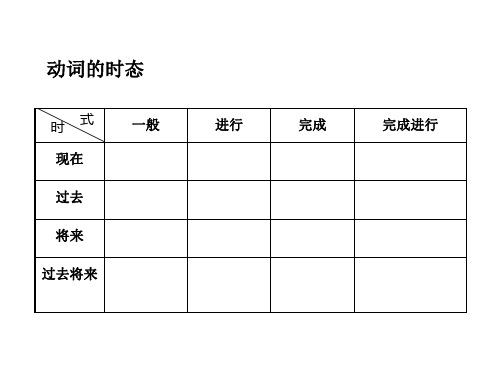
I'll write to you as soon as I arrive there. • 由if 引导的条件状语从句中可以用shall或will表
“意愿”,但不表示时态。
If you will accept my invitation and come to our party, my family will be pleased.如果你愿意接受并 参加我们的舞会,我的家人会非常高兴。
6)祈使句中 ( to give directions or instructions ) Go down the street, and then take the second turning on
the left.
知识扩展:一般现在时表将来
1)下列动词:come, go, arrive, leave, start, begin, return的一般 现在时表将来。这主要用来表示在时间上已确定或安排好的 事情 ( timetabled or fixed events )。 The train leaves at six tomorrow morning. When does the bus start? It starts in ten minutes.
You are always changing your mind. You are always doing well
He’s always asking the same question. 6. 状态动词的进行时后面接形容词brave; careful; stupid; clever; foolish; polite; kind; shy等时,为 主语所表现的非一般惯性特点或故意的行为。
6 )在the more…the more…句型中,从句也要用一 般现在时取代将来时。
“意愿”,但不表示时态。
If you will accept my invitation and come to our party, my family will be pleased.如果你愿意接受并 参加我们的舞会,我的家人会非常高兴。
6)祈使句中 ( to give directions or instructions ) Go down the street, and then take the second turning on
the left.
知识扩展:一般现在时表将来
1)下列动词:come, go, arrive, leave, start, begin, return的一般 现在时表将来。这主要用来表示在时间上已确定或安排好的 事情 ( timetabled or fixed events )。 The train leaves at six tomorrow morning. When does the bus start? It starts in ten minutes.
You are always changing your mind. You are always doing well
He’s always asking the same question. 6. 状态动词的进行时后面接形容词brave; careful; stupid; clever; foolish; polite; kind; shy等时,为 主语所表现的非一般惯性特点或故意的行为。
6 )在the more…the more…句型中,从句也要用一 般现在时取代将来时。
动词的时态和语态-PPT课件

8. The man _h_a_d__h_o_p_e_d__ (hope) to catch the last train, but he was too late.
9. The boys __w_e_r_e_p_l_a_y_in_g___ (play) basketball from 5:00 to 6:00 yesterday.Βιβλιοθήκη .19练习
.
20
用所给动词的正确形式填空: 1. She _l_e_ft__ (leave) the office two
hours ago. 2. As son as she arrived home, the girl
discovered that she _h_a_d__t_a_k_e_n__ (take) her friends book by mistake. 3. Who _c_o_m__e_s__ (come) to school earliest in your class every morning? 4. Great changes _h_a_v_e_t_a_k_e_n_p__la_c_e__ (take place) in this city since 1979. 5. By the time he was twelve, Edison _h_a_d__b_e_g_u_n_ (begin.) to sell newspape21rs.
I’ll go to see you when I have time. I’ll go to see you if I have time tomorrow. 2. 某些动词,如:stand, continue, wish, love, like, hate, feel, find, think等常用一般现在时态
9. The boys __w_e_r_e_p_l_a_y_in_g___ (play) basketball from 5:00 to 6:00 yesterday.Βιβλιοθήκη .19练习
.
20
用所给动词的正确形式填空: 1. She _l_e_ft__ (leave) the office two
hours ago. 2. As son as she arrived home, the girl
discovered that she _h_a_d__t_a_k_e_n__ (take) her friends book by mistake. 3. Who _c_o_m__e_s__ (come) to school earliest in your class every morning? 4. Great changes _h_a_v_e_t_a_k_e_n_p__la_c_e__ (take place) in this city since 1979. 5. By the time he was twelve, Edison _h_a_d__b_e_g_u_n_ (begin.) to sell newspape21rs.
I’ll go to see you when I have time. I’ll go to see you if I have time tomorrow. 2. 某些动词,如:stand, continue, wish, love, like, hate, feel, find, think等常用一般现在时态
《动词时态》课件

《动词时态完整版》PPT课件
时态介绍
简单现在时
表示经常性、习惯性的动作或存在的状态。
现在进行时
表示现在正在进行的动作。
简单过去时
表示过去发生的动作或存在的状态。
过去进行时
表示过去某一时刻正在进行的动作。
时态形式
基本形式
动词的基本形式,不带任何时 态标记。
进行时的形式
动词+be动词+现在分词形式。
完成时的形式
动词+have+过去分词形式。
一般将来时的形式
将来时态的特殊形式,用于表 示将要发生的动作或存在的状 态。
时态用法
1
简单现在时的用法
表示经常性的动作、客观事实或存在
简单过去时的用法
2
的状态。
表示过去发生的动作或存在的状态。
3
现在进行时的用法
表示现在正在进行的动作。
过去进行时的用法
4
表示过去某一时刻正在进行的动作。
时态错误
1 使用时态不规范
使用不正确的时态形式。
3 时态混淆
在表达意思时混淆时态的用法。
2 时态不一致
在同一句子或段落中使用不一致的时态。
4 常见时态错误
列举一些常见的时态错误及其纠正方法。
时态练习
单项选择题
测试学生对各种时态的掌握 程度。
完成句子
要求学生根据上下文选择合 适的时态形式填空。
翻译练习
提供一些句子,要求学生将 其翻译成英文。
总结生的时间和状态。
熟练掌握各种时态
学生需要熟练掌握各种时态, 以提高口语表达能力。
错误多练习,优化口语 表达能力
通过多次练习时态的正确使用, 可以帮助学生减少错误,提高 口语表达能力。
时态介绍
简单现在时
表示经常性、习惯性的动作或存在的状态。
现在进行时
表示现在正在进行的动作。
简单过去时
表示过去发生的动作或存在的状态。
过去进行时
表示过去某一时刻正在进行的动作。
时态形式
基本形式
动词的基本形式,不带任何时 态标记。
进行时的形式
动词+be动词+现在分词形式。
完成时的形式
动词+have+过去分词形式。
一般将来时的形式
将来时态的特殊形式,用于表 示将要发生的动作或存在的状 态。
时态用法
1
简单现在时的用法
表示经常性的动作、客观事实或存在
简单过去时的用法
2
的状态。
表示过去发生的动作或存在的状态。
3
现在进行时的用法
表示现在正在进行的动作。
过去进行时的用法
4
表示过去某一时刻正在进行的动作。
时态错误
1 使用时态不规范
使用不正确的时态形式。
3 时态混淆
在表达意思时混淆时态的用法。
2 时态不一致
在同一句子或段落中使用不一致的时态。
4 常见时态错误
列举一些常见的时态错误及其纠正方法。
时态练习
单项选择题
测试学生对各种时态的掌握 程度。
完成句子
要求学生根据上下文选择合 适的时态形式填空。
翻译练习
提供一些句子,要求学生将 其翻译成英文。
总结生的时间和状态。
熟练掌握各种时态
学生需要熟练掌握各种时态, 以提高口语表达能力。
错误多练习,优化口语 表达能力
通过多次练习时态的正确使用, 可以帮助学生减少错误,提高 口语表达能力。
动词时态语态ppt课件
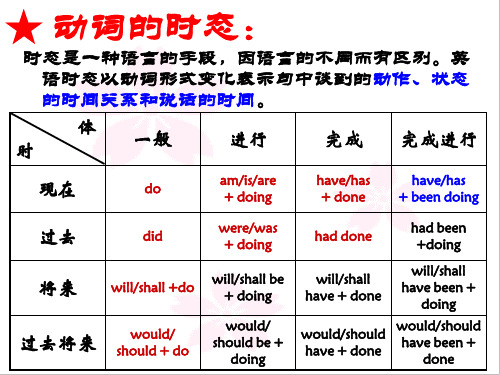
4) 用在一些句型里:
It is time you went to bed. I wish I were a bird. I'd rather you came tomorrow.
寒假来临,不少的高中毕业生和大学 在校生 都选择 去打工 。准备 过一个 充实而 有意义 的寒假 。但是 ,目前 社会上 寒假招 工的陷 阱很多
(客观安排) I’m going to play football tomorrow afternoon.
(主观安排)
■
现在进行时 寒假来临,不少的高中毕业生和大学在校生都选择去打工。准备过一个充实而有意义的寒假。但是,目前社会上寒假招工的陷阱很多
▲ 现在进行时的基本用法: a. 表示现阶段或目前正进行的动作。 We are waiting for you. Mr. Green is writing another novel this month.
doing
had done
had been +doing
will/shall have + done
will/shall have been +
doing
would/should have + done
would/should have been +
done
一般现在时的用法 寒假来临,不少的高中毕业生和大学在校生都选择去打工。准备过一个充实而有意义的寒假。但是,目前社会上寒假招工的陷阱很多 • 表示经常性或习惯性的动作或存在的状态,常
与表示频度的时间状语连用。 every…, sometimes, often, usually, on Sunday
I leave home for school at 7 every morning. He is alone.
It is time you went to bed. I wish I were a bird. I'd rather you came tomorrow.
寒假来临,不少的高中毕业生和大学 在校生 都选择 去打工 。准备 过一个 充实而 有意义 的寒假 。但是 ,目前 社会上 寒假招 工的陷 阱很多
(客观安排) I’m going to play football tomorrow afternoon.
(主观安排)
■
现在进行时 寒假来临,不少的高中毕业生和大学在校生都选择去打工。准备过一个充实而有意义的寒假。但是,目前社会上寒假招工的陷阱很多
▲ 现在进行时的基本用法: a. 表示现阶段或目前正进行的动作。 We are waiting for you. Mr. Green is writing another novel this month.
doing
had done
had been +doing
will/shall have + done
will/shall have been +
doing
would/should have + done
would/should have been +
done
一般现在时的用法 寒假来临,不少的高中毕业生和大学在校生都选择去打工。准备过一个充实而有意义的寒假。但是,目前社会上寒假招工的陷阱很多 • 表示经常性或习惯性的动作或存在的状态,常
与表示频度的时间状语连用。 every…, sometimes, often, usually, on Sunday
I leave home for school at 7 every morning. He is alone.
16种英语时态讲解PPT课件
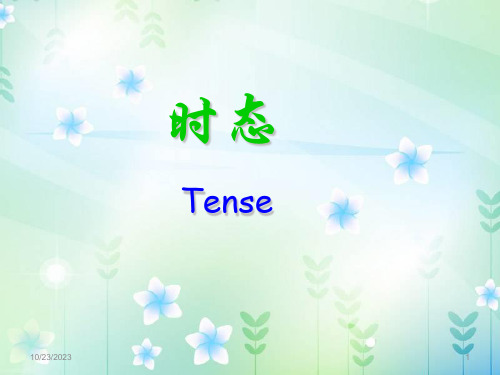
10/23/2023
8
五、现在进行时态
现在进行时的基本用法
形式: am/is/are + doing
用法1: 表示说话此刻动作正在进行.
• He is not available now. he is talking on the phone.
• Please don’t make so much noise. I am studying.
时态
Tense
10/23/2023
1
一、时态概述
16种时态 一般动作
现在 一般现在
过去 一般过去
进行动作 现在进行 过去进行
完成动作 现在完成 过去完成
完成进行动 现在完成
作
进行
过去完成 进行
将来 一般将来 将来进行 将来完成 将来完成
进行
过去将来 一般过去将来 过去将来进行 过去将来完成 过去将来完成
此用法常与一些表示动作频率的时间副词连用(副词放在be动词之 后, 实义动词之前).
1) 表示肯定的频率副词: always, frequently, usually, sometimes, often, occasionally, generally 等.
2) 表示否定的频率副词: never, seldom, rarely 等.
10/23/2023
6
四、一般将来时态
一般将来时的基本用法
形式:
will do 或be going to do
用法1: 表示预测将要发生某事,用will或be going to do.
1) be going to 特别意指根据目前的明显迹象来推断某件事 要发生; will 则只是表名说话人认为或相信某件事要发生
英语八大时态PPT课件(详细版)

时态
A
知识导航
种类
一般现在时 一般过去时 一般将来时 现在进行时 现在完成时 过去进行时 过去完成时 过去将来时
构成
do/does did will/shall+动词原形 am/is/are + doing have/has+过去分词 was/were + doing had+过去分词 would/should+动词原 形
A
4
※表示主语所具有的特征、性格、 能力、状态等
She is a middle school student. She looks a little worried. ※某些以here/there开头的句子 中,用一般现在时表正发生的动 作
Here comes the bus.
A
5
※表示将来发生的、时刻表上不改变的事 The train leaves Hunan at five o’clock. ※特殊情况 在时间状语从句和条件状语从句中,若主 句用一般将来时,则从句用一般现在代替 将来。(主将从现)
A
21
四、一般将来时
1、构成 一般将来时态由
“will/shall+动词原形”构成,me to ask Mary for help.
A
22
2、其他表示
※be going to +动词原形:表示 说话人主观的打算或预测。 I am going to look for a job here. It is going to be a fine day for camping tomorrow.
【小试牛刀】 他们昨天这个时候正在吃晚餐。
They were having dinner this time yesterday.
A
知识导航
种类
一般现在时 一般过去时 一般将来时 现在进行时 现在完成时 过去进行时 过去完成时 过去将来时
构成
do/does did will/shall+动词原形 am/is/are + doing have/has+过去分词 was/were + doing had+过去分词 would/should+动词原 形
A
4
※表示主语所具有的特征、性格、 能力、状态等
She is a middle school student. She looks a little worried. ※某些以here/there开头的句子 中,用一般现在时表正发生的动 作
Here comes the bus.
A
5
※表示将来发生的、时刻表上不改变的事 The train leaves Hunan at five o’clock. ※特殊情况 在时间状语从句和条件状语从句中,若主 句用一般将来时,则从句用一般现在代替 将来。(主将从现)
A
21
四、一般将来时
1、构成 一般将来时态由
“will/shall+动词原形”构成,me to ask Mary for help.
A
22
2、其他表示
※be going to +动词原形:表示 说话人主观的打算或预测。 I am going to look for a job here. It is going to be a fine day for camping tomorrow.
【小试牛刀】 他们昨天这个时候正在吃晚餐。
They were having dinner this time yesterday.
小学英语动词时态ppt课件
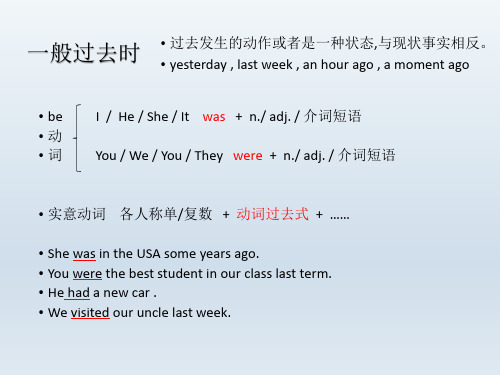
• Mom is sleeping at the moment. • The scientist is doing an experiment this week. • Jack is coming soon. (按计划将要发生的动作) • It is getting dark. (表示事物发生变化的过程)
一般将来时 • 将要发生的动作或事先计划好将要发生的动作。 • next week , tonight , in five minutes
• I / We + shall + 动词原形 + …… • 各人称单/复数 + will + 动词原形 + …… • be going to + 动词原形 + …… • Shall I / We + 动词原形 +…… (征求某人意见时) • 例句:Shall I open the window?
•
I have not finished my homework.
常用助动词:be , do , have , shall(should) , will(would)
• 4. 谓语为“情态动词+实意动词”时:
•
情态动词 + not + 动词原形
• 例句:
•
We can not go swimming this weekend.
三单
does not + 动词原形 He doesn't like ... She doesn't like ... It doesn't like ...
过去时 did not + 动词原形
• 3.谓语为“助动词+实意动词”时:
英语时态讲解课件.ppt
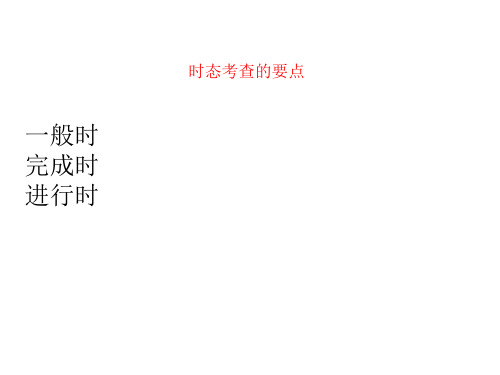
(2)现在完成时表示过去已经开始,持续到现在,也许还会持续下 去的动作或状态。可以和表示从过去某一时刻延续到现在(包括现 在在内)的一段时间的状语连用。 如:for和since,以及 so far, now, today, this week(month, year) 等。
① I haven’t seen her these days. ② She has learnt English for 3 years. ③ They have lived here since 1990. ④ What has happened to the USA in the last 350 years? 注意:表示短暂时间动作的词,如come, go, die, marry, buy等的完 成时不能与for, since等表示一段时间的短语连用。
-ing形式 going, looking
writing, taking
get, sit, put, run, getting, sitting,
begin
running,
beginning
现在完成时
1.现在完成时的构成:助动词have (has) + 动词的过去分词(done)
2.现在完成时的用法: (1)现在完成时表示过去发生或已经完成的某一动作对现在造成 的影响或结果。通常与表示包括现在在内的时间副词just,already, before, yet, never, ever ,up till now 等状语连用。 特别注意的是in the past/last+一段时间。 例如:
A. had met B. have met C. met
D. meet
答案B ;首先本题后句强调对现在的影响,我知道她的模样,你不 用描述。再次,several times告知为反复发生的动作,因此用现在 完成时。
英语时态介绍PPT课件

过去将来时
概念:指将发生的行为或存在状态,以及在过去某一特定时间做某事的意图、 计划或准备。 时 间 状 语 : t h e n e x t d a y ( w e e k , m o n t h , y e a r… ) , s o o n , i n a f e w m i n u t e s 等等。
现在完成时
概念:过去发生或完成的一个动作在现在的效果或结果,或从过去开始并持续 到现在的一个动作或状态。 时 间 状 语 : re c e n t l y , l a t e l y , s i n c e … f o r… , i n t h e p a s t f e w y e a r s 等 等 。
英语时态介绍PPT课件
演讲人
目录
01. 一般现在时 03. 现在进行时 05. 过去完成时 07. 过去将来时
02. 一般过去时 04. 现在完成时 06. 一般将来时
一般现在时
概念:一种频繁、反复出现的动作或行为和当前状态。 时间状语:always,usually,often,sometimes,everyweek等等。
一般过去时
概念:在过去某个时间发生的动作或状态;过去的习惯或惯例的行为、动作。 时间状语:ago,yesterday,thedaybeforeyesterday,lastweek等等。
现在进行时
概念:指在当前阶段或说话时发生的动作和行为。 时间状语:now,atthistime,thesedays等等。 4. 过去进行时 概念:在过去某一特定时间或时刻正在发生或正在发生的行为或动作。 时间状语:atthistimeyesterday,atthattime或以when引导的谓 语动词是一般过去时的时间状语等。
- 1、下载文档前请自行甄别文档内容的完整性,平台不提供额外的编辑、内容补充、找答案等附加服务。
- 2、"仅部分预览"的文档,不可在线预览部分如存在完整性等问题,可反馈申请退款(可完整预览的文档不适用该条件!)。
- 3、如文档侵犯您的权益,请联系客服反馈,我们会尽快为您处理(人工客服工作时间:9:00-18:30)。
一般过去时
3. 动词变化:动词变成过去式,动词加 “ed”
4. Play -> played
1) 辅音字母和“y”结尾的词,如carry -> carried
2) 重读闭音节的单词,双写最后一个字母,再 加ed
1) stop -> stopped
3) 不规则动词见书后动词表
一般过去时
4. 例句
1) He bought a book yesterday. 2) I watched a match last week. 3) He left here two days ago.
现在完成时
3. 表示动作已经完成
1) He has left . 2) I have already had a rest.
4. 表示动作不仅已经完成,还要持续(在这个用 法当中,动词要用延续性动词,与for引导的一 段时间和since引导的短语连用)
1) He has been away for two days. 2) I have already taught in this school since
英语动词时态讲解 课件
一般现在时
1. 表示一般情况和经常发生的动作。 2. 时间状语为
1) every day 或 every 引导的时间状语 2) often,always,usually
一般现在时
3. 动词碰到第三人称单数时,要加 “s”
1) work -> works 2) 辅音字母和“y”结尾的词,如carry ->
现在进行时
1. 表示正在发生的动作。 2. 时间状语:now /Look… /Listen… 3. 由be动词+动词ing构成 4. 动词变化加ing
1) clean -> cleaning 2) 以不发音“e”结尾的,去掉字母“e”,再加ing
1) make -> making
3) 重读闭音节的单词,双写最后一个字母,再加ing
现在完成时
1. 动词变化 动词变成过去分词加ed
1) Play -> played 2) 辅音字母和“y”结尾的词,如carry ->
carried 3) 重读闭音节的单词,双写最后一个字母,再
加ed
1) stop -> stopped
4) 不规则动词见书后动词表
2. 动词由have(has)+ 过去分词 构成
carries 3) 以s、x、ch、sh结尾的加“es”,如wash -
> washes 4) go -> goes 5) do -> does 6) have -> has
一般现在时
4. 例句
1) He goes to school on foot every day. 2) We often have supper at home. 3) She doesn’t do her work every Sunday.
1990. 3) The bird has been dead for a month. 4) We have made lots of friends since we came
here.
过去进行时
1. 指在过去的某一个时间正在发生的动作。 2. 时间状语
1) at this time yesterday 2) at five o’clock yesterday afternoon
3. 动词由be动词+动词ing形式构成 4. 例句
He was watching TV at this time yesterday.
过去将来时
1. 指对过去的某一个时间来讲,将要发生的 动作。
2. 动词由would+动词原型构成。 3. 例句
He would go to the park the next day. He said he would work hard next term.
3. 动词变化:will + 动词原型 4. 例句
1) I will visit you tomorrow. 2) He won’t come back next week.
一般过去时
1. 指过去发生的动作或事Байду номын сангаас 2. 时间状语:
1) yesterday 引导的词组 2) ago 引导的词组 3) last 引导的词组 4) the day before yesterday
过去完成时
1. 指对过去的某一个时间来讲,已经发生的 动作。
2. 动词由had+过去分词构成。 3. 例句
she had borrowed a book before she went to the park.
We had learned many new words by the end of last term.
swim -> swimming
现在进行时
4. 例句
1) The boys are playing now. 2) Look! They are planting trees. 3) Listen! He is singing.
一般将来时
1. 表示将来发生的动作。 2. 时间状语:
1) next 引导的词组 2) tomorrow 引导的词组 3) the day after tomorrow
